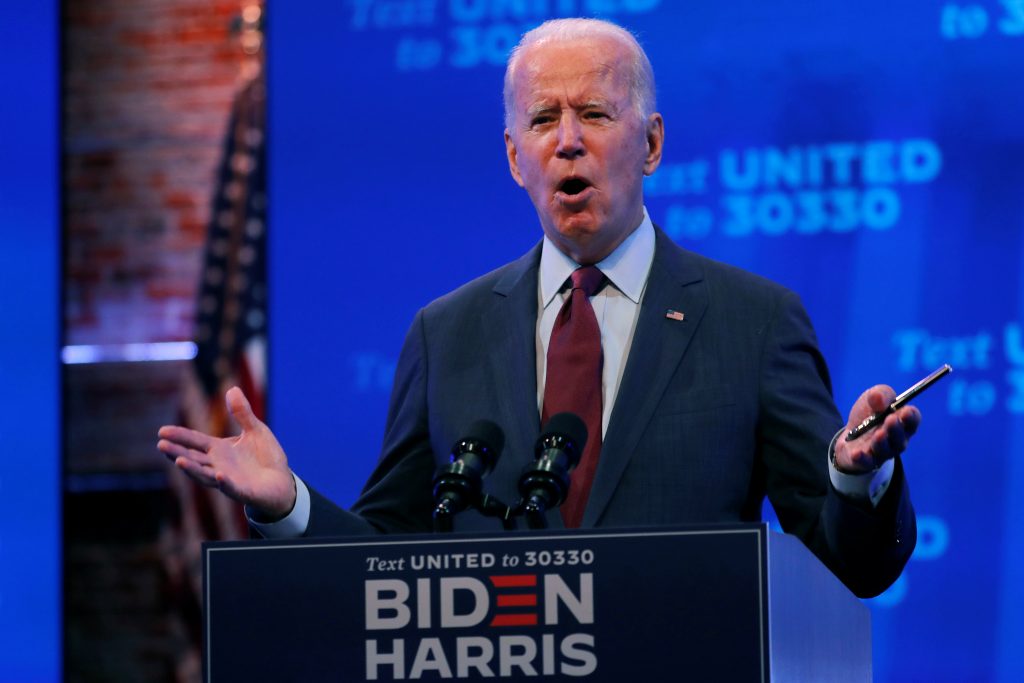Trading the Aftermath of a Biden Victory in November

Personal politics aside, the result of the Nov. 3 presidential election will dictate the direction of the country over the next four years.
This is critical for investors and traders because the policies and initiatives enacted during this time will greatly impact the business environment—that in turn affects asset prices and the stock market.
One can’t overlook the fact that the results of the Congressional elections in November will also play a huge role in the direction taken by the country. While the House of Representatives is expected to remain in the hands of the Democrats, there are 35 seats up for re-election in the Senate.
Election modeling conducted by The Economist suggests the Democrats are 99% likely to maintain control over the House and 68% likely to gain control of the Senate.
If Democrats win control of the White House and both houses of Congress, their ability to institute real change in Washington would be a lot more probable. A Democratic White House alongside a Republican Senate would more than likely result in several more years of gridlock.
Importantly, history shows that the stock market (since 1945) has actually performed better with a Democrat in the White House, as compared to a Republican—an 11.2% average annual return versus a 6.9% average annual return. The sum of which means the outlook for the stock market remains strong no matter who wins the election.
Listed below are some of the key market sectors and policy areas that would probably be most affected by a new regime in the White House.
Energy and Resources Policy
Vice President Biden has been vocal about his belief in climate change and his support for the reduction of greenhouse gas emissions. One of the cornerstones of his platform involves the so-called “Green New Deal,” which is a resolution that lays out a grand plan for tackling climate change.
The Green New Deal takes its name and inspiration from the historical government initiative known as the New Deal, launched by President Franklin D. Roosevelt to help the United States recover from the Great Depression.
The Green New Deal would theoretically combine Roosevelt’s economic model with a modern approach, focusing on renewable energy and resource efficiency. The operating mission of the Green New Deal is working toward a future in which global greenhouse emissions would be net-zero by 2050.
The above means that the election of Joe Biden would undoubtedly buoy the fortunes of companies involved in “green” products, technology and services.
One stock that would likely thrive under the Green New Deal is NextEra Energy (NEE). NextEra develops, constructs and operates long-term contracted assets with a focus on renewable generation facilities.
Other stocks to watch in this sector include Ballard Power Systems (BLDP), Brookfield Renewable Partners (BEP), First Solar (FSLR), Renewable Energy Group (REGI) and SolarEdge Technologies (SEDG).
Healthcare and Pharmaceuticals
Healthcare may be one of the areas most impacted by a Biden victory in November. It’s almost certain that Biden, with the help of a Democratic Congress, would move to strengthen the Affordable Care Act (ACA). If the Senate remains under Republican control, any significant changes to the ACA would be unlikely.
Biden’s statements indicate he is seeking to make the ACA more flexible in terms of choice, as well as expanding it to include more Americans by making it more affordable. The latter would theoretically be executed by raising government subsidies to the plans offered in the ACA exchanges.
Biden does not back a “Medicare-for-all” single-payer system, but has voiced support for lowering the Medicare eligibility age to 60, from 65. At least 30 million Americans remain uninsured today.
President Trump has attempted to repeal the ACA, and would likely continue to do so if elected to a second term. The incumbent has stated it’s a plan to “repeal-and-replace,” but no replacement alternative has been produced during his first term.
Both candidates have voiced support for lower pharmaceutical prices, as well as for expanded domestic production of essential medicines and equipment.
Healthcare stocks actually led the market higher immediately after Joe Biden’s Super Tuesday success during the primaries—a potentially positive sign for this sector, should he ascend to the White House. An expansion of the ACA is viewed as bullish for healthcare stocks (more people paying into the system), but a drop in pharmaceutical pricing would potentially offset that optimism.
Some stocks to monitor from this sector in the event of a Biden victory include: Biogen (BIIB), Centene (CNC), Gilead (GILD), Incyte (INCY), Mylan (MYL), Neurocrine Biosciences (NBIX), Teladoc Health (TDOC) and UnitedHealth (UNH).
International Trade Policy
Under President Trump, the White House has advocated for greater trade protectionism and imposed a series of tariffs on China, Mexico, Canada, the European Union and other trading partners.
While it’s not definitively known how Biden might move forward on international trade initiatives, one can look back at Biden’s eight years in the Obama administration and surmise that he would likely guide the country back toward multilateralism and globalism, at least to a degree.
However, Biden might do so through the lens of the ongoing pandemic—meaning his approach to trade and foreign policy might be slightly different than what was observed during the Obama administration.
For example, he and his team have likely recognized the importance of manufacturing certain products in the United States for national security reasons, such as personal protective equipment, medical equipment and pharmaceuticals.
It should be noted that international treaties are historically approved by the Senate. President Trump circumvented the traditional process with the Phase 1 China Trade Agreement by calling it a “contract” instead of a treaty. Biden would likely revert to a more traditional approach to trade deals, in which Congress also takes a role in crafting and approving them.
Biden has already stated he plans to rejoin the Paris Climate Agreement, but that would be easier to achieve with a Democrat-controlled Senate. Biden has also stated his intention to re-enroll the United States in the World Health Organization (WHO).
China remains a bit of a question mark, as Biden has not made clear whether he will continue the trade war (and associated tariffs) initiated by President Trump.
Companies with heavy exposure to China that could benefit from improving relations include: A.O. Smith (AOS), Microchip IPG Photonics (IPGP), Technology (MCHP), Texas Instruments (TXN), Qorvo (QRVO), Qualcomm (QCOM) and Western Digital (WDC).
Taxation Policy
It’s almost certain that a Biden victory would translate to significant changes as it relates to tax policy in the United States. However, any changes of consequence would likely require a Democrat-controlled Senate.
Biden has stated unequivocally that he will not raise the taxes of Americans making more than $400,000 per year.
However, it is almost assured that he would seek to increase the corporate tax rate, the same rate that was reduced through tax reductions championed by President Trump. Biden has stated he would raise corporate taxes to 28%, from 21%. Corporate taxes were reduced under the Trump administration from 35% to 21%.
It’s believed that Biden would also impose sanctions on international tax havens if he wins the White House.
President Trump, for his part, has said he plans for “tax cuts 2.0” during his second term, although the details of such an initiative haven’t yet been revealed.
Since Sept. 1, Trump has temporarily paused the payment by individuals of “payroll taxes,” which are paid into Social Security. Those changes can’t be made permanent without Congressional approval.
Recession Response
No matter who wins the White House in November, it’s expected that a new round of stimulus will be passed in the wake of the election to help with the economic recovery.
Currently, Democrats are seeking a package worth about $2.5 trillion-$3 trillion, whereas Republicans are seeking a more modest package worth $1 trillion-$1.5 trillion. Should Biden win the White House, it would seem more likely the larger stimulus package would be enacted. That’s all but guaranteed if Democrats carry both Houses of Congress.
Notably, Biden has stated unequivocally that he believes the role of the President is to ensure that the Federal Reserve operates independently from the political sphere. President Trump, on the other hand, has openly criticized leaders at the Fed and their decision-making during his tenure.
These and other election issues are covered extensively in the November issue of Luckbox magazine, which releases Tuesday, Sept. 29, at luckboxmagazine.com.
To follow all the election updates affecting the financial markets, readers are encouraged to tune into TASTYTRADE LIVE weekdays from 7 a.m. to 3 p.m. Central Time.
Sage Anderson is a pseudonym. The contributor has an extensive background in trading equity derivatives and managing volatility-based portfolios as a former prop trading firm employee. The contributor is not an employee of luckbox, tastytrade or any affiliated companies. Readers can direct questions about any of the topics covered in this blog post, or any other trading-related subject, to support@luckboxmagazine.com.




















